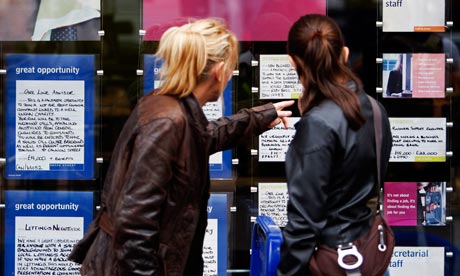Women's financial security and human rights are under attack on a scale not seen in "living memory" due to the coalition's austerity measures, according to a report released today.
Backed by more than 20 charities, unions and academics, the report by the Fawcett Society shows how the cuts are pushing women out of the workforce, driving down their income and undermining hard-won access to justice and protection from violence.
The report, A Life Raft for Women's Equality, offers key policy recommendations to reverse the impact the cuts will have on women's jobs, benefits and key services as state services are withdrawn.
The report is published on the same day that the home secretary, Theresa May – who is also minister for women and equalities – outlines the government's approach to women and the economy.
May will announce an ambitious plan to recruit and train 5,000 volunteer business mentors to help women who want to start or grow their own businesses.
"Business people tell us that they want to take advice from other business people. So the business mentors will be experienced individuals who can provide tailored advice and support. They will be a huge help to women entrepreneurs," May is to say.
Anna Bird, acting chief executive of the Fawcett Society, said: "Our report identifies a series of targeted and achievable policy measures that could be adopted by, or at, the 2012 budget, which together offer a life raft for women's equality – and never has the need been so great.
"Women have not faced a greater threat to their financial security and rights in living memory. Decades of steady, albeit slow, progress on equality is being dismantled, as cuts to women's jobs and the benefits and services they rely on, turn back time on women's equality."
The number of women out of work is at a 23-year high, with cutbacks in the public sector hitting women particularly hard: two-thirds of the 130,000 jobs lost in local authorities since the first quarter of 2010 were held by women.
"Women up and down the country are experiencing greater hardship. For those families affected, the cuts to women's jobs, services and benefits will represent a personal loss," said Bird. "But we must add to this the cost to wider society as women's opportunities are scaled back.
"Fewer women working, a widening gap in pay between women and men, entrenchment of outdated gender roles at work and at home, and women being forced into a position where they must increasingly rely on a main breadwinner or the state for financial subsidy – this is the picture that emerges when the many policies of economic austerity are stitched together."
The report calls on the government to restore support for childcare costs for low-income families to the level before April 2011. This, says Bird, would "help ensure paid employment makes financial sense for the many low-income women who've found they are better off not working".
Another recommendation is ring-fencing funds for Sure Start centres. "This would further protect women's access to employment and shore up the other vital benefits these centres offer thousands of families," said Bird.
The society calls on the coalition to stop local authorities from treating violence against women services as a soft touch for cuts. "We need to ensure some of the most vulnerable women in the UK have access to the support they need," said Bird.
Signatories to the report include Eaves Housing for Women, the End Violence Against Women coalition, Unison, Child Poverty Action Group, Daycare Trust, White Ribbon Campaign UK, and Rape Crisis.
"We need urgent action to stop women being ground down by the government's devastating cuts," said Dave Prentis, Unison's general secretary. "Women's jobs and pensions are under serious attack. They are being hit hard by unemployment, the rising cost of living and cuts to benefits and services to young people."
Alison Garnham, chief executive of Child Poverty Action Group, agreed. "Child poverty and the incomes and services women are able to access are intrinsically linked. The vast majority of child benefit is received by women, whether as the main carer in a couple, or as a single parent.
"It is hugely unfair that such a large burden of the government's cuts should be falling on the shoulders of women and children, and it would be profoundly wrong if these unfair cuts to child benefit became permanent."
A Home Office spokesperson said: "Fairness is facing up to the reality of the financial situation we are in and not leaving our children to pick up the bill. This government is protecting services for the most vulnerable and focusing resources where they are most needed and most effective.
"We are taking 1.1 million of the lowest-paid workers – most of whom are women – out of income tax altogether, introducing flexible parental leave and extending flexible working, and taking action to reduce the gender pay gap."

above, are now being dismantled. Photograph: Luke Macgregor/Reuters
